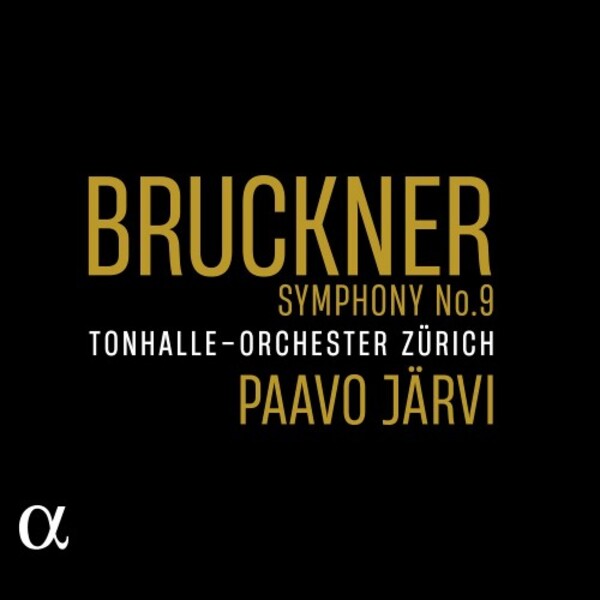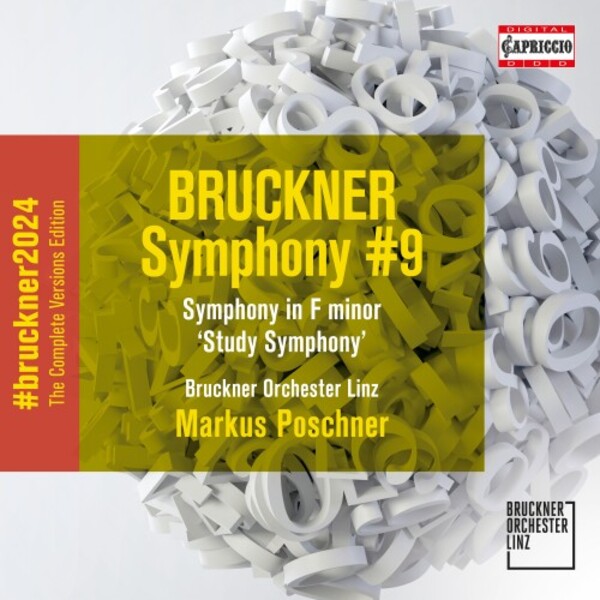BRUCKNER Symphony No 9 (Järvi; Poschner )
View record and artist detailsRecord and Artist Details
Genre:
Orchestral
Label: Alpha
Magazine Review Date: AW2024
Media Format: CD or Download
Media Runtime: 61
Mastering:
DDD
Catalogue Number: ALPHA1068

Tracks:
| Composition | Artist Credit |
|---|---|
| Symphony No. 9 |
Anton Bruckner, Composer
Paavo Järvi, Conductor Zurich Tonhalle Orchestra |
Genre:
Orchestral
Label: Capriccio
Magazine Review Date: AW2024
Media Format: CD or Download
Media Runtime: 56
Mastering:
DDD
Catalogue Number: C8096

Tracks:
| Composition | Artist Credit |
|---|---|
| Symphony No. 9 |
Anton Bruckner, Composer
Linz Bruckner Orchestra Markus Poschner, Conductor |
| Symphony No. 00, 'Study Symphony' |
Anton Bruckner, Composer
Linz Bruckner Orchestra Markus Poschner, Conductor |
Author: Christian Hoskins
Capriccio’s release of the first and last of Bruckner’s symphonies sees the completion of the cycle conducted by Markus Poschner, the first to include all of the different versions published in the New Anton Bruckner Complete Edition. The Symphony in F minor, often designated No 00, was completed in 1863 while Bruckner was studying with Otto Kitzler, and although it lacks the scale and depth of the later symphonies, it already finds the composer using sonata form with three distinct subject groups, a feature found in all of his subsequent symphonies, as well as his familiar duplet-plus-triplet rhythmic formation.
Poschner’s new recording is perhaps the finest in his 18-CD cycle, an interpretation that’s wonderfully alert to the work’s melodic and rhythmic ingenuity. The faster movements have tremendous impetus and the playing of the Andante is both limpidly beautiful and remarkably impassioned. It’s a performance that belies the traditional view of the work as an apprentice composition and very effectively moves it closer to the orbit of the great works that would follow. It’s a pity that Poschner, like Tintner and Skrowaczewski, omits the exposition repeats in the outer movements. The recordings by Inbal, Young, Schaller and Thielemann all include them, and to my mind the symphony sounds more balanced as a result. Nevertheless, Poschner’s account is an impressive achievement and one I would not want to be without.
Both Poschner and Paavo Järvi perform the three-movement version of the Ninth Symphony without any of the completions that various musicians and musicologists have attempted. Poschner’s performance has both weight and a sense of momentum, and enjoys especially sensitive playing in the Adagio. I’m not enamoured of the unmarked crescendos that appear in the final minute of the first movement, but otherwise this is a powerful and involving interpretation that can be warmly recommended to anyone collecting the Capriccio cycle.
Paavo Järvi previously recorded an impressive and somewhat overlooked Bruckner cycle with the Frankfurt Radio Symphony Orchestra for RCA. Fifteen years on, Järvi’s pacing of the Ninth Symphony’s outer movements is less broad than before, but otherwise the interpretation is little changed. Heard side by side, the two recordings sound remarkably similar, both being slightly light in the bass compared with the warm recording of Poschner’s version. The main difference between the two versions comes in terms of the playing, which seems to me a touch more expressive in Frankfurt than in Zurich, especially in the later stages of the Adagio. Largely for this reason, the earlier account is not displaced by the newcomer.
Discover the world's largest classical music catalogue with Presto Music.

Gramophone Digital Club
- Digital Edition
- Digital Archive
- Reviews Database
- Full website access
From £8.75 / month
Subscribe
Gramophone Full Club
- Print Edition
- Digital Edition
- Digital Archive
- Reviews Database
- Full website access
From £11.00 / month
Subscribe
If you are a library, university or other organisation that would be interested in an institutional subscription to Gramophone please click here for further information.




